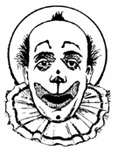
The Wisdom of Silliness
A HINT OF HEAVEN
The classics not only lift the mind to a contemplation of the true, the good, and the beautiful, but also bring the intellect down to earth to delight in the comical. In The Canterbury Tales Chaucer alludes to the proverbial stargazing philosopher who searches the heavens but loses contact with reality in his abstraction. The result is ludicrous: He falls in a ditch! In Shakespeare’s As You Like It the clown sings:
When that I was a tiny little boy,
With hey, ho, the wind and the rain,
A foolish thing was but a toy,
For the rain it raineth every day.
What do those words mean? They are nonsense, just as Mother Goose’s nursery rhymes are silly: “Hey diddle, diddle, the cat and the fiddle! The cow jumped over the moon.” But silliness and nonsense make more sense than Orwellian Newspeak, politically correct words, “inclusive” language, and ideological jargon. Three great comic writers — George MacDonald, G.K. Chesterton, and Shakespeare — defend the wisdom of nonsense.
George MacDonald’s novel At the Back of the North Wind celebrates the wisdom of nonsense. Diamond, the main character, is a young boy who delights the baby in the family by his improvised rhymes — nonsense to his mother — which bring irrepressible smiles to his infant brother. Whenever Diamond sings these nursery rhymes, the entire atmosphere of the home is transformed from a place of gloom and anxiety to a realm of play and lightheartedness. The infant bursts with laughter as Diamond sings:
And baby’s the bonniest
And baby’s the funniest
And baby’s the shiniest
And baby’s the tiniest
And baby’s the merriest
Diamond’s playfulness with baby and his silly, entertaining verses prompt his mother to remark, “I declare a body would think you had been among the fairies.” When Diamond begs his mother to read from a collection of nursery rhymes they accidentally find on the sand, the mother complains about the “nonsense” of the poem because “it would go on forever”:
I know a river
whose waters run asleep
run run ever
sleeping so deep
and all the swallows
that dip their feathers
in the hollows
or in the shallows
are the merriest swallows of all.
Diamond’s reply to his mother’s criticism of the poem as rambling and going on “forever” is “that’s what it did,” referring to the gurgling of the river at the back of the North Wind, the heavenly world he visits at night in his dreams. The jingling of the nursery rhymes and the rushing of the river echo with the pure music of words and sounds that bubble from fountains of never-ending joy. Thus “nonsense” in MacDonald’s story means neither stupidity nor absurdity nor contradiction. Nonsense is another name for fun and a hint of Heaven. It is a quality associated with a “silly,” which Diamond defines as “a kind of angel — a very little one.” Nonsense is the musical language of mirthful fairies and joyful angels in the heavenly world known in the story as “the back of the North Wind.”
You May Also Enjoy
In Chesterton's view, the English people dominated their history — at least until the rise and ultimate dominance of Parliament.
Man does not make himself. Rather, as Aristotle remarked, he is already man when he begins to wonder what he is and why he is as he is.
GKC did believe creation and its Creator are good, but not that the majority of people would always choose rightly or that any merely human structure would endure.

